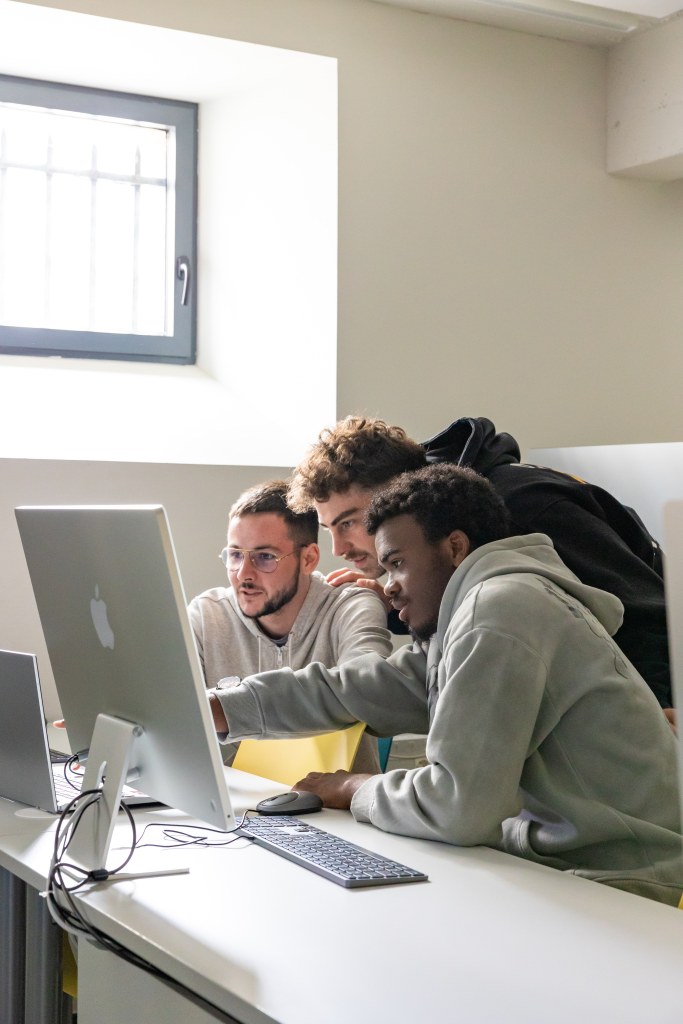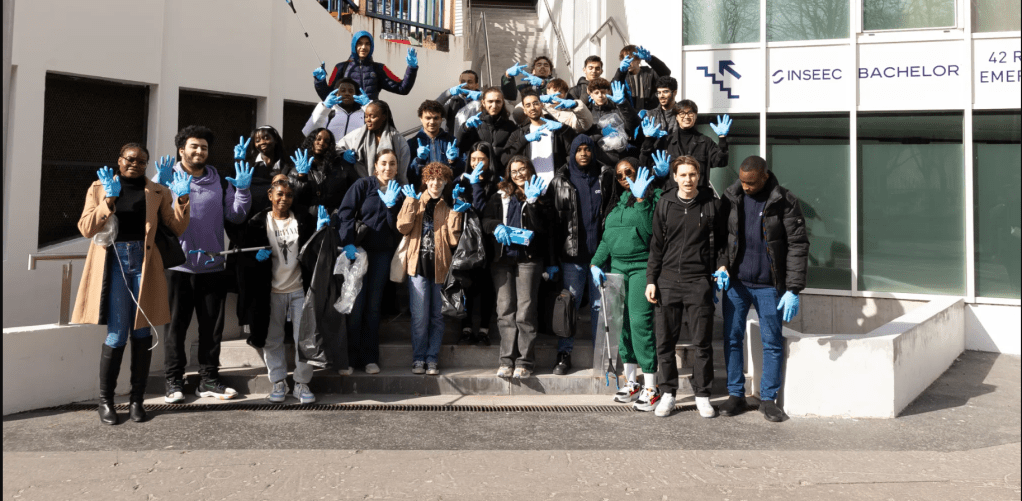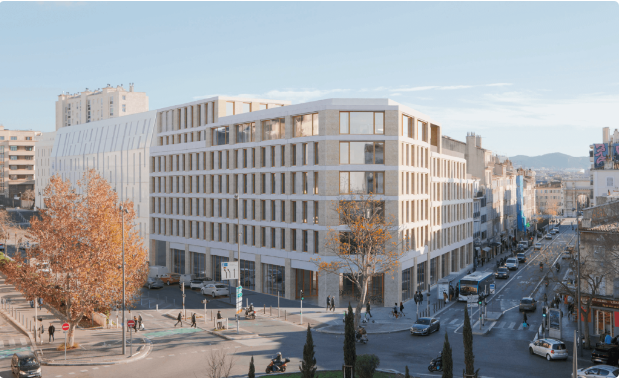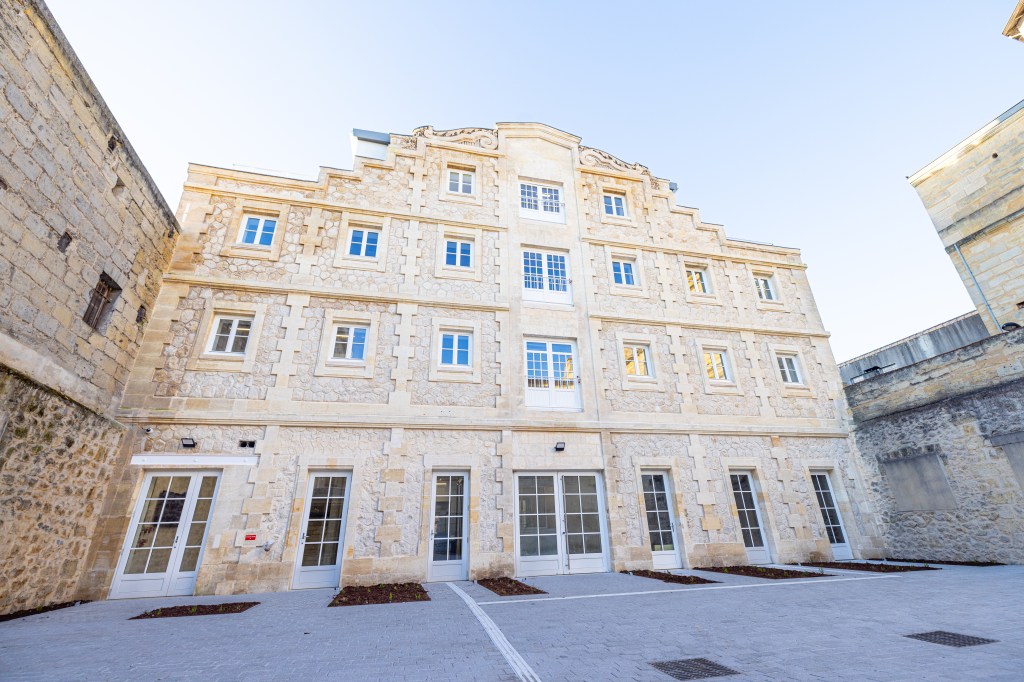OBJECTIVES
Commit to the #decarbonization of our activities: reduce our GHG emissions by 14% by 2030 and contribute to Europe’s carbon neutrality by 2050, through our mitigation plan based on 11 targeted actions.
Commit to the #sustainability of our operations: responsible procurement, digital sobriety, sustainable food services, low-carbon mobility, and eco-friendly campuses.
#Adapt to climate change and protect #biodiversity and #water resources.
100%
zero plastic campuses
100%
of our suppliers committed to CSR
14%
reduction in GHG emissions targeted by 2030
Sustainability & Decarbonation
The Campus, as a place of student life integrated into society, must be exemplary in terms of environmental responsibility. We integrate sustainable management practices in several key areas: energy management, waste management, zero plastic, water conservation, cigarette butt recycling, digital use, catering, purchasing and mobility. We deploy an action plan for campuses that are integrated into their territory, inclusive and sober, and we measure progress annually.
Based on the results of our carbon footprint assessment, we have developed an ambitious mitigation plan to achieve our target of a 14% reduction in CO₂ emissions by 2030.
This plan focuses on the main sources of emissions in order to reduce our carbon footprint and protect biodiversity, involving key departments and the entire OMNES Education community.
In addition, a Climate Change Adaptation Plan (PAACC) is currently being developed for each campus, with the aim of identifying risks and proposing solutions to adapt in a scenario of a +4°C rise in temperatures.

biodiversity
In this new year, preserving biodiversity is becoming a major issue on our campuses. Aware of the importance of taking action for our environment, we are placing this issue at the heart of our CSR actions.
Our employees and students play a central role in this approach. That’s why we’re setting up training and awareness-raising initiatives on each of our campuses, to help them better understand the issues and become agents of change…
- Participatory biodiversity assessments were conducted on the Bordeaux and Chambéry campuses, involving ecologists, staff, and students. These environmental health check-ups led to the development of treatment plans: concrete action plans to strengthen local biodiversity.
- A Biodiversity Charter was created and implemented, structured around three pillars: preserving and protecting the existing biodiversity on our campuses; raising awareness and training our community to better understand biodiversity issues and adapting our infrastructure while promoting the regeneration of local ecosystems.
- Development of educational gardens: following the creation of the Eiffel 1 garden, two new gardens were established on the Rennes and Chambéry campuses, reinforcing the connection between urban agriculture, sustainable food, and biodiversity.
- Dedicated programs have been set up to raise awareness and provide training on biodiversity-related challenges.
- Access to a biodiversity learning pathway: a specific serious game focused on the preservation and enhancement of biodiversity.
- Organization of a Green Café featuring a talk by a biodiversity expert.
- Implementation of a “Water Plan” aimed at educating and preserving water resources in order to contribute to the protection of ecosystems.
OMNES Education has been a member of the “Entreprises Engagées pour la Nature” program since July 2025 and is committed to implementing a Biodiversity Action Plan that will be audited by the French Biodiversity Office (OFB).

Sustainable Water Management Plan

In response to droughts, water stress, flood risks, and the pollution of aquatic environments, OMNES Education is taking concrete action to make sustainable water management a key driver of its ecological transition.
The Water Plan, implemented across the entire group, is built around three core commitments:
Optimizing and reusing water through appropriate equipment and sustainable practices, Preserving water resources by limiting usage and designing low-impact spaces and Educating and raising awareness among students and staff about water conservation
This strategy is already being translated into concrete measures implemented and shared across all of the group’s sites :
- Elimination of plastic still water bottles from vending machines and installation of water fountains.
- Launch of the “Green Game – Water Edition”, an inter-campus challenge focused on reducing water consumption, with 14 participating campuses and two proposed actions each month.
- Awareness-raising initiatives, including a Green Café dedicated to water featuring Emma Haziza, a hydrologist specializing in climate change adaptation, as well as targeted educational content (water cycle, water footprint, oceans…).
- Replacement of all conventional cleaning products with eco-friendly alternatives that are safe for both the environment and water quality.
- School-led initiatives focusing on water and ocean conservation.
RESPONSIBLE PURCHASING
OMNES Education is committed to evaluating and challenging its suppliers on social, environmental and societal aspects. As a responsible player, we ensure the integrity of our entire value chain.
- Favouring local and responsible suppliers: reducing the environmental impact of transport and promoting sustainability labels and CSR standards.
- CSR Charter and questionnaire: our service providers must demonstrate that they reduce their social and environmental impacts, respect human rights, promote access to employment, and assess their environmental footprint.
- All promotional items are responsibly sourced, using recycled materials and short supply chains.

Digital Responsibility

The digital sector accounts for 2.5% of France’s carbon footprint and 17% of that of our Group. Aware of this impact, we have implemented a Group-wide responsible digital charter to reduce this footprint. This charter encourages more sustainable digital practices by prioritizing efficiency, sustainability, inclusion and security.
- Responsible digital use: digital eco-gesture guide and resource kit distributed to all campuses, with participation in “Digital Clean up Day” to reduce data storage.
- Systematic reuse and recycling of equipment, with collection points for small items.
- Choice of equipment with a high reparability index and purchase of reconditioned equipment.
- Extending the lifespan of IT infrastructures and hardware.
- Assured protection against cyber attacks and for our personal data
100% of the appliances collected are reused and/or recycled.
Energy: conservation and renewable sources
The Group’s carbon footprint, carried out at the end of 2022, shows thatOMNES Education campuses stand out for their energy efficiency, with 82% of their energy consumption coming from renewable sources. To reinforce this performance and support our commitment to decarbonization, we have implemented several concrete actions:
- Adoption of sustainable solutions such as 100% LED lighting and the installation of automatic detectors.
- Integrating energy performance clauses into our contracts.
- Renovating buildings to improve their energy performance.
- Implementation of a building management system to monitor energy consumption.
To engage the OMNES Education community, we launched an energy challenge between 7 campuses during the autumn-winter period, with the goal of collectively reducing energy consumption.

low-carbon mobility

We are strengthening our low-carbon mobility policy by implementing several measures to promote sustainable business travel:
- Awareness-raising and incentives: Introduction of a “sustainable mobility” package offering a bonus for the purchase of a bicycle and a free public transport pass for employees.
- Development of teleworking: Promote teleworking to reduce commuting.
- Mobility plan for each campus: Draw up a specific mobility plan for each campus to optimize travel.
- The Group has beena signatory of CANIE ( Climate Action Network for International Educators) since 2024 to lower our carbon footprint linked to the international mobility of our students.
WASTE MANAGEMENT
A variety of initiatives are being launched to raise environmental awareness and promote waste reduction:
- Participation in the European Week for Waste Reduction (EWWR) on the Lyon and Paris campuses
- Recycling garbage cans for at least three streams on all campuses
- Zero plastic campus: elimination of plastic water bottles and disposable cups, with the installation of water fountains to encourage the use of water bottles.
- Installation of bottle deposit systems in Bordeaux and Paris.
- Recycling cigarette butts on the Bordeaux and Lyon campuses.

OMNES Education’s new campuses committed to environmental innovation

Marseille Campus
The new Marseille campus, scheduled for completion in 2026, embodies innovation and ecological sustainability. As the first demonstrator of the “build with earth” program, it adopts a low-carbon, circular economy approach. Built with recycled cement by BCorp-accredited company REDMAN, the campus stands out for its ecological innovations.
This project was awarded the “Jury’s Favourite” prize at the 2025 Positive Awards, highlighting its exemplary contribution to the ecological transition.

Bordeaux Campus
The extension of the Bordeaux Chartrons campus is an innovative example of sustainability, combining the rehabilitation of a historic building with modern ecological practices.

Campus de la Defense
The La Défense campus stands out for its innovative and sustainable approach. By combining modern facilities with eco-responsible practices, it creates an advanced learning environment while minimizing its environmental impact. It incorporates efficient management solutions for water, energy and waste, making it a model of sustainability in the heart of the business district.
Last update on


